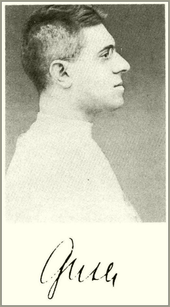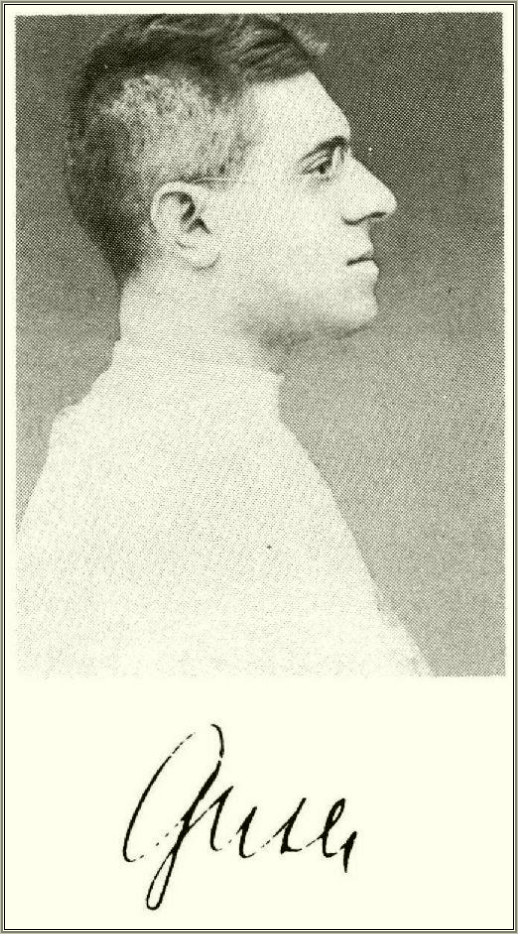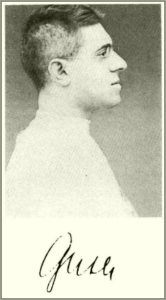| Antal Guth | |
 |
|
| Born | March 31, 1886. Szamoskóród |
| Deceased | Parisafter 1938 |
| Citizenship | Hungarian |
| Occupation | doctor, politician |
| His/her position |
|
|
Wikimedia Commonshas media related toAntal Guth. |
|
| Template•Wikidata• Help | |
His life
Notes
- ↑ József Bölöny's book "The Governments of Hungary" and the Labor Movement History Encyclopedia incorrectly state March 29th as the date of birth.
Notes
- ↑ Judit Kövendi: Jász Dezső, the revolutionary publicist. Budapest, 6th vol. 2nd issue (1968) p. 13.
- ↑ Albert Váry.Victims of the Red Rule in Hungary. Budapest: HOGYF EDITIO. ISBN 978 963 848 400 0
- ↑The marriage was registered in the Budapest II. district state marriage registry under number 461/1915.
- ↑ Budapest Royal Court, judgment no. 33313/1917.
- ↑World War, Revolution, Terror, Trianon. October 1918: "We lost this war!" SlidePlayer. (Accessed: 12 May 2015)
- ↑Exclusion and reprimand in the Medical Association. Budapesti Hírlap, vol. 40, no. 128 (1920), p. 3.
Resources
- Mátyás Rákosi:Recollections (1892–1925). Volume II. Budapest, 200, Napvilág Kiadó, p. 868.
- Albert Váry:Victims of the Red Rule in Hungary. Budapest, [é. n.] HOGYF EDITIO.
- Guth Antal. Hungarian Biographical Index. Petőfi Literary Museum. Accessed: 23 March 2016.
- Antal Guth's works in the catalogue of the National Széchényi Library.
- Minutes of the Revolutionary Governing Council 1919.Edited by Magda Imre and László Szűcs. Budapest, 1986, Akadémiai Kiadó, p. 41.
- József Bölöny:The Governments of Hungary. Bp., 1987, Academic Publishing House.
- Labor Movement History Encyclopedia.Edited by Henrik Vass – Endre Bassa – Ernő Kabos. Budapest: Kossuth Publishing House. 1972.
More information
- Lajos Verbai:We are still indebted to his memory. On the 100th anniversary of the birth of Antal Guth. Népszava, 1986. No. 75. p. 7.
- Minutes of the Revolutionary Governing Council 1919.Edited by Magda Imre and László Szűcs. Budapest, 1986, Academic Publishing House.
- Révai New Lexicon. Editor-in-chief. Colleague István Tarsoly. Szekszárd, Babits, 1996-.
- New Hungarian Biographical Lexicon. Editor-in-chief. László Markó. Budapest, Hungarian Book Club.
- The Council Republic in Fehér County. Székesfehérvár, 1969.
- [Tibor Győri]:Dr. Antal Guth. Szolnok, 1974.
Guth Antal
Enőrzött
| Guth Antal | |
 |
|
| Született | 1886. március 31. Szamoskóród |
| Elhunyt | 1938után Párizs |
| Állampolgársága | magyar |
| Foglalkozása | orvos, politikus |
| Tisztsége |
|
|
A Wikimédia CommonstartalmazGuth Antaltémájú médiaállományokat. |
|
| Sablon•Wikidata• Segítség | |
Élete
[ szerkesztés]Megjegyzések
[ szerkesztés]- ↑ Bölöny JózsefMagyarország kormányaic. könyvében és a Munkásmozgalomtörténeti lexikonban is tévesen március 29. van feltüntetve a születés dátumául.
Jegyzetek
[szerkesztés]- ↑ Kövendi Judit: Jász Dezső, a forradalmár publicista. Budapest, 6. évf. 2. sz. (1968) 13. o.
- ↑ Váry Albert.A vörös uralom áldozatai Magyarországon. Budapest: HOGYF EDITIO. ISBN 978 963 848 400 0
- ↑ A házasságkötés bejegyezve a Budapest II. ker. állami házassági akv. 461/1915. folyószáma alatt.
- ↑ Budapesti kir. törvényszék 33313/1917. sz. ítélet.
- ↑ Világháború, forradalom, terror, Trianon. 1918 október: „ Ezt a háborút elvesztettük!. SlidePlayer. (Hozzáférés: 2015. május 12.)
- ↑ Kizárás és megrovás az Orvosegyesületben. Budapesti Hírlap, 40. évf. 128. sz. (1920) 3. o.
Források
[ szerkesztés]- Rákosi Mátyás:Visszaemlékezések (1892–1925). II. kötet. Budapest, 200, Napvilág Kiadó, 868. o.
- Váry Albert:A vörös uralom áldozatai Magyarországon. Budapest, [é. n.] HOGYF EDITIO.
- Guth Antal. Magyar Életrajzi Index. Petőfi Irodalmi Múzeum. Hozzáférés ideje: 2016. március 23.
- Guth Antal művei az Országos Széchényi Könyvtárkatalógusában.
- A Forradalmi Kormányzótanács jegyzőkönyvei 1919. Szerk. Imre Magda és Szűcs László. Budapest, 1986, Akadémiai Kiadó, 41. o.
- Bölöny József:Magyarország kormányai. Bp., 1987, Akadémiai Kiadó.
- Munkásmozgalom-történeti lexikon.Szerkesztette Vass Henrik – Bassa Endre – Kabos Ernő. Budapest: Kossuth Könyvkiadó. 1972.
További információk
[ szerkesztés]- Verbai Lajos:Adósai vagyunk még emlékének. Guth Antal születésének 100. évfordulójára. Népszava, 1986. 75. sz. 7. o.
- A Forradalmi Kormányzótanács jegyzőkönyvei 1919. Szerk. Imre Magda és Szűcs László. Budapest, 1986, Akadémiai Kiadó.
- Révai Új Lexikona. Főszerk. Kollega Tarsoly István. Szekszárd, Babits, 1996-.
- Új magyar életrajzi lexikon. Főszerk. Markó László. Bp., Magyar Könyvklub.
- A tanácsköztársaság Fehér megyében. Székesfehérvár, 1969.
- [Győri Tibor]:Dr. Guth Antal. Szolnok, 1974.
https://karlmarx-lu.translate.goog/das-kapital-hui1921.html?_x_tr_sl=de&_x_tr_tl=en&_x_tr_hl=en&_x_tr_pto=wapp
The Soviet Republic of 1919 planned the translation ofCapital , but was unable to realize it.Antal Guth (1886-1938) was one of the People's Commissars who had to flee into exile in Austria after the suppression of the Soviet Republic. The doctor had come into contact with the Social Democrats in the army during the First World War and became a member of the Communist Party in 1918.
In Vienna, the Communist Party commissioned him to translateDas Kapitalso that he could continue the fight against the restoration in Hungary from exile.Inthe afterword, the physician of German descent points out the great difficulties of such a translation under the conditions of exile. He had first thought of proletarian readers, which is why he preferred to use forced Hungarian expressions rather than foreign words. But it was important to provide the Hungarian proletariat, which had already practically implemented Marx's teachings, with the theoretical instrument (Vol. 2, p. [237]).
The first volume of ATőkewas published in two parts. Since the afterword is dated November 1921, the second part may not have been published until early 1922. The page numbers of the two volumes are not consecutive, and the volumes also contain separate indexes. In the table of contents of the first part, several page numbers are incorrect.
The translation only contains the foreword and afterword by Karl Marx to the first and second German editions. The second edition was no longer published by Meissner-Verlag after 1872. This and text comparisons suggest that AntalGuth used Karl Kautsky'spopular edition,first published by Dietz-Verlag in 1914,asa model for his translation. The canonical fourth edition was protected by copyright until the end of 1925 thanks to the collaboration of Friedrich Engels.
The Viennese publisher Julius Fischer published left-wing literature in Hungarian in the early 1920s. It is not mentioned in Murray G. Hall'sAustrian Publishing History 1918-1938 (Böhlau, 1985).
A printing company is only mentioned in the second volume: Elbemühl in Vienna. The Elbemühl paper company, founded in 1878, owned several printing companies and was taken over by the banker and industrialist Richard Kola in 1920.
Georg Wiener writes that it is not known whetherthe translation could be read in Hungary (p. 120). It is not mentioned in the preface to the second translation in 1933. Few copies of the edition seem to have survived in Hungary.
German translation:
Die Räterepublik von 1919 plante die Übersetzung desKapital, konnte sie aber nicht mehr verwirklichen.
Zu den Volkskommissaren, die nach der Niederschlagung der Räterepublik ins österreichische Exil flüchten mussten, gehörte Antal Guth (1886-1938). Der Arzt hatte während des Ersten Weltkriegs in der Armee Kontakt zu den Sozialdemokraten bekommen und wurde 1918 Mitglied der Kommunistischen Partei.
In Wien beauftragte ihn die Kommunistische Partei mit der Übersetzung vonDas Kapital,um den Kampf gegen die Restauration in Ungarn aus dem Exil fortzusetzen.Im Nachwort weist der Mediziner deutscher Abstammung auf die großen Schwierigkeiten einer solchen Übersetzung unter den Bedingungen des Exils hin. Er habe zuerst an proletarische Leser gedacht, weshalb er lieber forciert ungarische Ausdrücke benutzt habe als Fremdwörter. Aber es sei wichtig gewesen, dem ungarischen Proletariat, das Marxens Lehre bereits praktisch ungesetzt habe, auch das theoretische Instrument zu liefern (Bd. 2, S. [237]).
Der erste Band von A Tőkeerschien in zwei Teilen. Da das Nachwort auf November 1921 datiert ist, kam der zweite Teil vielleicht auch erst Anfang 1922 heraus. Die Seitenzahlen der beiden Teilbände sind nicht fortlaufend, die Teilbände enthalten auch getrennte Sachverzeichnisse. Im Inhaltsverzeichnis des ersten Teils sind mehrere Seitenangaben fehlerhaft.
Die Übersetzung erhält nur das Vor- und Nachwort von Karl Marx zur ersten
und zweiten deutschen Ausgabe. Die zweite Ausgabe wurde nach 1872 nicht mehr im Meissner-Verlag veröffentlicht. Dies und Textvergleiche lassen vermuten, dass AntalGuthKarl Kautskys 1914 zum ersten Mal im Dietz-Verlag erschieneneVolksausgabealsVorlage seiner Übersetzung benutzte. Die kanonische vierte Auflage war durch die Mitarbeit Friedrich Engels bis Ende 1925 urheberrechtlich geschützt.
Der Wiener Verlag Julius Fischer brachte Anfang der Zwanzigerjahre linke Literatur auf Ungarisch heraus. Er wird nicht in Murray G. HallsÖsterreichischer Verlagsgeschichte 1918-1938 (Böhlau, 1985) erwähnt.
Eine Druckerei wird nur im zweiten Band genannt: Elbemühl in Wien. Der 1878 gegründete Papierkonzern Elbemühl besaß mehrere Druckereien, er wurde 1920 von dem Bankier und Industriellen Richard Kola übernommen.
Georg Wiener schreibt, dass nicht bekannt sei, obdie Übersetzung in Ungarn gelesen werden konnte (S. 120). Sie wird nicht im Vorwort der zweiten Übersetzung 1933 erwähnt. In Ungarn scheinen wenige Exemplare der Ausgabe erhalten.
1919 (Budapest, 1986, nach S. 48).
https://peoplepill.com/i/antal-guth
Quick Facts
Intro
Physician, politician
was
Work field
Gender
Male
Place of birth
Corod, Culciu, Satu Mare County, Romania
Star sign
Death
Place of death
Paris, Île-de-France, France
Age
51 years




 Aries
Aries
